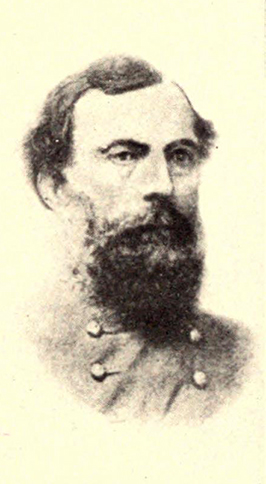13 Nov. 1804–21 June 1880

Theophilus Hunter Holmes, Confederate general, was born near Clinton in Sampson County, the son of Gabriel and Mary Hunter Holmes. His father was governor of the state from 1821 to 1824. In 1825 young Holmes entered West Point, from which he graduated in 1829 in the same class as Robert E. Lee and one year behind Jefferson Davis. He served in the Seminole War and became a captain in 1838. In 1841 he married Laura Wetmore, of North Carolina, the niece of George E. Badger who was President William Henry Harrison's secretary of the navy; they became the parents of four sons and two daughters. During the Mexican War Holmes "gallantly led" a storming party at the siege of Monterrey and won promotion to the brevet rank of major. Following that conflict he served mainly in the West. In 1855 he became a regular major, and in 1859 he took command of the army recruiting service with headquarters on Governor's Island, N.Y., where his wife died shortly afterwards.
In April 1861, rather than take part in the Fort Sumter relief expedition, Holmes resigned his commission and returned to North Carolina to assist in organizing the state troops. His friends and fellow officers at Governor's Island urged him to reconsider his decision and offered to obtain a leave of absence for him so he could spend the period of the war in Europe; however, without hesitation he declined. In June President Davis, a close friend, appointed Holmes a brigadier general in the Confederate Army and assigned him to the Aquia Creek area of Virginia. The following month his brigade joined the Confederate forces near Manassas Junction but, through no fault of his, he did not arrive on the field in time to participate in the Battle of First Manassas on 21 July 1861.
Promoted to major general in October 1861, Holmes commanded the Fredericksburg District until March 1862, when Davis assigned him to command the Department of North Carolina where "he did creditably in reorganizing the defenses of the State, though he may not have been aggressive" in combating Union coastal attacks. Summoned by Lee to aid in the defense of Richmond, his division on 30 June 1862 advanced against the Union forces at Malvern Hill but was forced to retreat by overpowering artillery fire. Receiving no orders to do so, he did not join in Lee's futile assault on Malvern Hill the next day.
In July 1862 Davis appointed him commander of the Trans-Mississippi Department with headquarters at Little Rock, Ark., and in October promoted him to lieutenant general, a rank he initially declined. During November and December the War Department repeatedly ordered him to transfer troops across the Mississippi River to Vicksburg, then threatened by Grant's army advancing southward through Mississippi, but he refused on the grounds that this would lead to the Federal occupation of Arkansas. Although Grant's offensive failed, Holmes's noncompliance with orders, plus the defeat of Confederate forces at Prairie Grove, Ark., on 7 Dec. 1862 and at Arkansas Post on 11 Jan. 1863, prompted Davis to place General Edmund Kirby Smith in charge of the Trans-Mississippi and to reduce Holmes's command to the District of Arkansas in February 1863.
In June 1863 Kirby Smith, on urging from the War Department, authorized Holmes to attempt the capture of Helena, Ark., in the desperate hope of relieving pressure on Vicksburg, now besieged by Grant. Early on the morning of 4 July Holmes's 8,000 troops made a poorly coordinated assault on the strongly fortified Union garrison at Helena, and after some initial success were driven back with the loss of over 1,600 men. Not only was the attack ill-conceived, but also it was ill-managed by Holmes who, on realizing he had failed, vainly sought death on the battlefield. On 23 July, giving illness as the reason, he temporarily relinquished his command to Major General Sterling Price, who on 10 September evacuated Little Rock and retreated to southern Arkansas, where later that month Holmes resumed command.
On 29 Jan. 1864, Kirby Smith asked Davis to replace Holmes with a "younger and more energetic officer." Learning of this, Holmes angrily resigned his post on 28 February and returned to North Carolina where he commanded the state reserve troops until the end of the war. He spent his last years on a small farm near Fayetteville and was buried in the cemetery at MacPherson Presbyterian Church in a soldier's coffin, as he had wished.